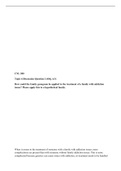Cnl 500 topic 2 dq 2 - Study guides, Class notes & Summaries
Looking for the best study guides, study notes and summaries about Cnl 500 topic 2 dq 2? On this page you'll find 19 study documents about Cnl 500 topic 2 dq 2.
All 19 results
Sort by

-
CNL 500 Topic 2 Discussion Question 2 (Obj. 2.1, 2.2, and 2.3)
- Other • 2 pages • 2023
-
Available in package deal
-
- $9.99
- + learn more
What is the primary goal in Jungian analysis? What are the four stages of the individuation journey that characterizes Jungian analysis? What type of client would benefit from this approach to counseling?

-
CNL 500 Topic 8 Discussion Question 2 (Obj. 8.1)
- Other • 2 pages • 2023
-
Available in package deal
-
- $9.99
- + learn more
How can you, as a counselor, avoid becoming "stuck" in a particular theoretical framework? Identify specific ways that you can ensure you continue to grow. What are some trends you are interested in learning about now that you understand counseling theory?

-
CNL 500 Topic 3 Discussion Question 2 (Obj. 3.1, 3.2, and 3.3)
- Other • 2 pages • 2023
-
Available in package deal
-
- $9.99
- + learn more
Could you be genuine, accepting, and empathic with all clients? What type of client or presenting issue would create a challenge for you in terms of being genuine, accepting, and empathic? How would you work with clients with whom you did not feel these three conditions?

-
CNL 500 Topic 7 Discussion Question 2 (Obj. 7.1, and 7.3)
- Other • 2 pages • 2023
-
Available in package deal
-
- $9.99
- + learn more
Short-term theories have become popular in the past number of years due to the pressure from insurance companies and the legal needs to address the clients' presenting problems. With this in mind, why might it be important to consider using solution-focused theory? What can a counselor do to make sure they support their client effectively in a short-term situation? How do your skills need to change when your time with a client is limited?
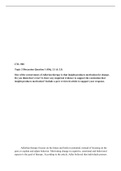
-
CNL 500 Topic 2 Discussion Question 1 (Obj. 2.1, and 2.3)
- Other • 2 pages • 2023
-
Available in package deal
-
- $9.99
- + learn more
One of the cornerstones of Adlerian therapy is that insight produces motivation for change. Do you think that’s true? Is there any empirical evidence to support the contention that insight produces motivation? Include a peer-reviewed article to support your response.
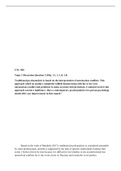
-
CNL 500 Topic 1 Discussion Question 2 (Obj. 1.1, 1.3, and 1.4)
- Other • 2 pages • 2023
-
Available in package deal
-
- $9.99
- + learn more
Traditional psychoanalysis is based on the interpretation of unconscious conflicts. This approach relied on another completely fallible human being with his or her own unconscious conflict and problems to make accurate interpretations. Comment on how this approach can have legitimacy. Does a contemporary psychoanalytic two-person psychology model offer any improvement in this regard?
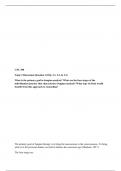
-
CNL 500 Topic 2 Discussion Question 2 (Obj. 2.1, 2.2, and 2.3)
- Other • 2 pages • 2023
- Available in package deal
-
- $9.99
- + learn more
CNL 500 (Theories and Models of Counseling) Topic 2 Discussion Question 2 (Obj. 2.1, 2.2, and 2.3) Description: What is the primary goal in Jungian analysis? What are the four stages of the individuation journey that characterizes Jungian analysis? What type of client would benefit from this approach to counseling?
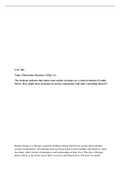
-
CNL 500 Topic 5 Discussion Question 2 (Obj. 5.1)
- Other • 2 pages • 2023
-
Available in package deal
-
- $9.99
- + learn more
The textbook indicates that choice intervention strategies are a central element of reality theory. How might these strategies be used in conjunction with other counseling theories?
What are the issues of individual and cultural diversity a counselor must consider when using REBT and behavioral theories?
How could the family genogram be applied to the treatment of a family with addiction issues? Please apply this to a hypothetical family.

Did you know that on average a seller on Stuvia earns $82 per month selling study resources? Hmm, hint, hint. Discover all about earning on Stuvia




